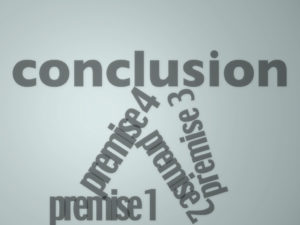Premises Determine the Conclusions
False Premises Yield False Conclusions
Last week’s post (Fallaciousness of Autonomy) began with the premise that Lucifer beguiled Woman into accepting a false premise leading to a false conclusion that led to her making a fateful decision to sin. This week I want to explore this relatively simple but profound concept and its implications for all of us today.
Genesis is not a collection of cute children stories of no value to logical adult analysis, as is so often thought {yes, even in evangelical churches the truths of Genesis are reduced to cutesy children stories hiding their spiritual truths}. Genesis begins with a profound philosophical premise and develops its proofs in a logical style encapsulated for timeless transmission across cultures.
I want us to look “under the hood” so to speak of logical analysis and see what we missed in approaching Genesis simply as bible stories for children. Aristotle’s logic had a profound influence on subsequent Western culture; yet, he did not invent logic but simply described what was already in existence (Stanford Encyclopedia of Philosophy). It became the basis for what is commonly called the “scientific method”. I find it amusing that those who claim to strictly adhere to this logical form reject God and His Gospel as logically unprovable {skepticism}. It is amusing because their very statement that God does not exist is unprovable by the scientific method which is strictly limited to what is measurable and repeatable. Since God is spirit {not measurable} He cannot be determined empirically (Jo 4:24). The skeptic has accepted a false premise that all knowledge can be determined empirically; therefore, his conclusions are fallacious no matter how sound his analysis may be.
Herein is the problem: every issue begins with a set of premises {those assumptions that are assumed to be true without proof}. Data is collected, analysis performed {this is the thinking part} and conclusions determined. Hence, if the premises are incorrect, the conclusion(s) must be incorrect. If the analysis is incorrect one may reach a true conclusion! However, this is akin to guessing and not reliable.

Woman Sinned by Accepting
Lucifer’s False Premises
Lucifer cast doubt in Woman’s mind about the veracity of God’s statement of death. God spoke of death in its fulness {physical and spiritual} whereas Lucifer and Woman spoke of death in its physical sense {logical fallacy of Equivocation}. When Woman accepted the fallacious redefinition of death she left the protection of the true premise, eating of the Tree of Knowledge brings death. She then accepted Lucifer’s false premise that the only difference between her and God was knowledge. If she could obtain the same knowledge as God then she would be a god also. Thus, her acceptance of a false premise resulted in a false conclusion leading to a demonstration of her false logic. The sin was not eating from the Tree of Knowledge. The sin was rejecting God as the arbiter of Good and substituting herself as an arbiter of good (Mk 10:18). Even Jesus plainly stated that He was not the source of Good, only the Father.
God is the only arbiter of Good because He alone is Creator. This is the foundational premise of Scripture (Ge 1:1; Je 18:1-6; Ze 12:1; Ro 9:14-21). He does not determine Good because He is stronger or more knowledgable; He determines Good because He is the Creator of everything! Good is based on His immutable {unchangableness} character (Ja 1:16-17). This means it is impossible for God to lie {violate His character-sin} (Tit 1:1-3; Ja 1:13). Woman rejected these premises, sinned and enticed Man to sin with the same logical issues plus her new-found sensuality. Thus, Woman was deceived to sin, Man willingly sinned (1Ti 2:13-14). This invoked another logical contradiction since both were striving to be as gods!
By definition God is omnipresent, omnipotent and omniscient. The problem is that being “omni” means there can be only one. If there is more than one then the definition is violated. They can be equivalent but this is not the biblical premise of God. This is the underpinnings for conflict to determine who will be the final arbiter of good, or be as god. This is revealed when God speaks to Woman and Man about their rejection of Him (Ge 3:16). Hence, the natural result of sin is conflict {violence} (Ja 4:1-3). The internal witness of sin is guilt, advising one that God’s morality {Goodness} has been transgressed (Ge 3:8-11; Ex 20:1-17).

False Premise: Man is god yields
False Conclusion and Guilt
Since man is made in the “image of God” {has God’s moral code written internally}, violation of God’s goodness brings guilt. Man has been seeking respite from guilt apart from God’s Gospel grace of forgiveness. Adam and Eve hid from God in the Garden after their sin. Romans details how man seeks to redefine his sinful self as good in order to remove the internal witness of his sin; i.e., guilt (1:18-32).
Man rejected the truth of God that may be known through His creation (Ps 19). Thus, proper empiricism points to the knowledge that God is. Improper empiricism {false premise} determines that there is no God {false conclusion}. Man at first worshiped creation directly in the forms of tangible idolatry. Today, man’s idolatry is man making atheism a religion of man as god. The more man sought to redefine good {morality} to excuse sin, the more man demonstrated his foolish futility. People can agree on any standard of good they wish but that does make it valid, it only demonstrates their foolishness (2Co 10:12). The further from God man sought to escape to assuage his guilt, the more animalistic he became in his behavior. Physical morality mirrors spiritual morality. Man demonstrates this corollary today in Western society defining as acceptable all manner of licentiousness under the banner of LGBT as but one example. These people are no more sinful than any other sinner, they have however regressed closer to searing their consciences (1Ti 4:1-2). They are in danger of losing their guilt, becoming self-actualized (Maslow). While psychology may make this sound desirable, the reality is you do what you want, when you want, without regard to the consequences. Psychology sees this as an admirable goal {studying the lives of these theorists should give one pause}. The Bible shows, and is consistent with experience, that man cannot define his own good. All attempts have only proved his sinfulness and need for God’s salvation.
Today, man still seeks to gain more knowledge to prove he is god and that there is no other god beside himself. Man ignores the reality of world-wide systemic violence. He claims to seek peace while distributing violence wholesale across the globe. Those who claim a different source of morality resort mainly to violence also. Yet, amid this turmoil God sends out His Gospel for those weary of their burden of sin. “Matthew 11:28
Come to me, all who labor and are heavy laden, and I will give you rest” (Mt 11:28). The Spirit and those who are His already say, “Come” (Re 22:17). Reject the false premise of being as god. God does not ask you to sacrifice yourself for sin; instead, He sacrificed His Son for YOU, your sin. Come and find true knowledge and peace.

